What I Learned in 6000 Hours of Dota 2
I’m basically still a beginner.
Since 2013, I’ve spent close to 6,000 hours (250 days) playing Dota 2, hereafter referred to as just Dota. Like most addictions, it’s been filled with highs and lows. Over the years, it has made and ruined friend/relationships, cost sleep and money, caused and relieved stress, been a crutch in times of hopelessness, and taught me humility, dedication, teamwork, anger management, and more. I’ve quit the game many times and returned just as many.
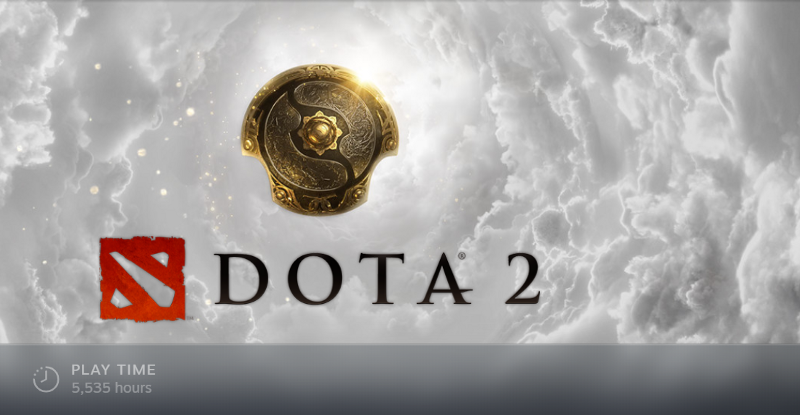
In this article I answer the elusive questions:
a.) why play 6000 hours of any game, let alone one as frustrating as Dota?
b.) what could you possibly learn it?
c.) why is Dota so addictive?
a.) why play 6000 hours of any game, let alone one as frustrating as Dota?
b.) what could you possibly learn it?
c.) why is Dota so addictive?
And more!
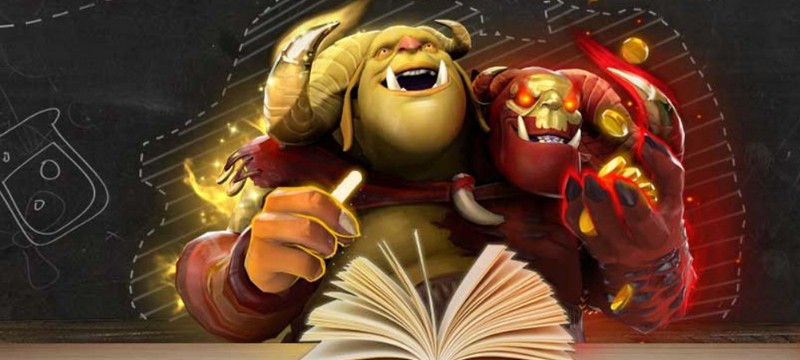
If your only familiarity with Dota is from the catchy Basshunter song, then let me break it down for you real quick.
What’s a Dota?
Dota is an online video game where two teams of 5 players battle against each other in a roughly 40 minute match to destroy the other team’s base AKA, their Ancient. Each player controls a hero, one of 100+ unique characters with spells and lore that a player can choose to play at the outset of a match.

Dota started as a Warcraft 3 mod, Defense of the Ancients (DotA), and grew so much in popularity that Valve Software hired the original creator of DotA, IceFrog, as well as a few other talented designers and developers to create a standalone sequel. However, since DotA was developed in the Warcraft 3 universe, Blizzard held intellectual property rights on the name Defense of the Ancients. Valve executive Erik Johnson argued that the name Dota referred to a concept, not an acronym, and Valve won a trial in May 2012 for the commercial trademark use of Dota. The result is the sequel we know and love today, Dota 2, or simply Dota.
Dota is often compared to League of Legends (LoL), which was created between Defense of the Ancients and Dota 2. Though the goals and overviews are similar, there are enough differences that many players consider them to be in different gaming genres entirely. However, I personally believe the addictive nature of both LoL and Dota are similar, as both claim player bases with thousands of players that have thousands of hours played and can binge their game for days.
6000 Hours is Nothing
While that might sound like a lot of time to spend playing any one game, it’s not even close to what many players have invested, especially professional (pro) players.
According to DotaBuff, a well-known analysis site for Dota matches, it doesn’t even come close to the top 100 players with the most time played. As of writing this, the player who takes the DotaBuff number 1 spot in time played is AthamRage, claiming 1 year and 266 days and counting in-game playtime. That’s over 15,000 hours spent playing Dota. The 100th player is MaH9IK with 1 year and 65 days.

One might claim that these hours are easily inflated by just “idling” in the in-game menu but not actually playing. To address this we can cross-evaluate time played with the “matches played” metric. As seen above, AthamRage has 21,150 matches played, similar to the other top 5 players. But how long is an average Dota match?
Over the past 7 years, the average game length has hovered around 40 minutes¹. Under this assumption, we can conclude AthamRage has spent around 14,100 hours ((21,150 * 40) / 60) actively playing. For reference, I have about 5000 matches in my lifetime career.
The point is, while I have played a lot of Dota, I’m far from an outlier.
Over the course of an 8 year run, Dota’s playerbase has set record after record. Peaking at 12 million active players, Dota has been nothing short of a titan in the industry. It’s exceedingly common to drop thousands of hours in this game. In 2018 the average active Dota player spent 1,284 hours in-game. 55 days. That’s in a single year, folks. This doubles the 2nd place contender for Steam games, Final Fantasy XIV at 669 average in-game hours.
Stats like these have made the game something of a legend among hardcore gamers. When new players ask how to learn Dota, the running joke is that the first 1000 hours of the game are the tutorial. Once you finish that, congratulations, you still suck.
I must be pretty good at the game, though, right? Well, yes and no.
Over my time playing I’ve grinded my way to the top 0.1% of players by rank. At my best, I was the 3,300th highest ranked player in North America (important to note that Dota is a worldwide game). Pretty good, you might think. Unfortunately, I’m still light years behind pro players. The gap between me and the top 1000 players in North America is enormous², let alone the top 1000 players world wide. Pro players tend to be in the top 1000, have an encyclopedic knowledge of the game, and have something special to offer their team, like an unorthodox play style, unparalleled mastery of a hero, or a captain’s leadership. It’s not good enough to just be high ranked.
So again, while I’m good, I’m nothing special.
That said, my 6000 hours has taught me quite a bit.
Why Dota?
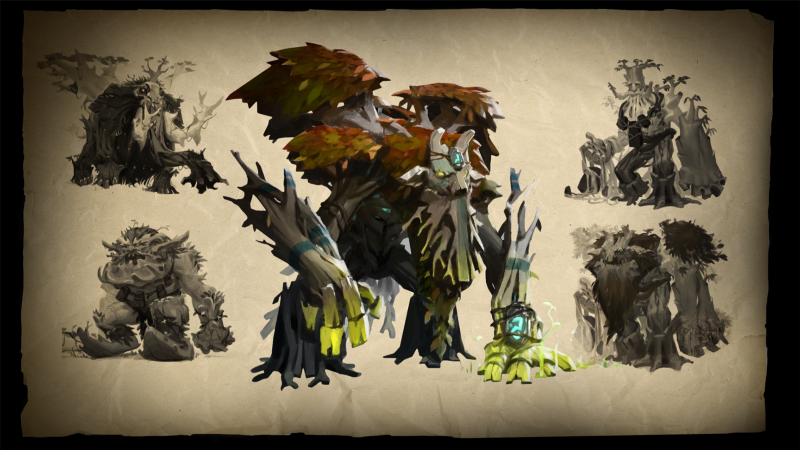
I could list reasons like:
1.) It’s free to play.
2.) Gameplay is deep and constantly evolving.
3.) The art and lore is immersive.
1.) It’s free to play.
2.) Gameplay is deep and constantly evolving.
3.) The art and lore is immersive.
And so on. But honestly, it comes down to coincidence and something more subtle.
In the Oberlin College Computer Science lab, early 2013, a good friend asks me if I want to take a break from my lab to play a game with him and some friends. The night was droning on and I had been trying to debug a script for too long. It was a harmless request, and I decide it’ll be therapeutic. I agree. We fetch beer and a motley crew of exhausted CS majors. We boot up our laptops, and my friend explains the pure basics of Dota to me and a couple others who hadn’t played yet. It sounded exciting and complicated.
I don’t think we won a single game that night.
If we did, it was not because of me. In fact, a cat walking across my keyboard would have probably helped my team more than whatever I was doing.
I remember thinking I’d never played anything so complex in my life, and I’d played complex games as long as I could remember. It was a confusing, uphill battle with my team having to explain every step of the way.
At that time, the game was in beta, so many features weren’t implemented. Worse, the game wasn’t well-balanced yet. Many of the randomly assigned opponents we matched against were “smurfs”, meaning high skill players masquerading as low skill players to dominate low skill games. Why would someone do that, you ask? Dopamine and ego. Winning Dota feels good, but crushing your opponents feels great. Or at least it does in the mind of the average egocentric Dota player.
Even though we lost, I had a blast. I’m sure the beer helped, but the concept of the game was interesting. Plus I loved learning news things, and I was making friends.
As a competitive soul, I invested the next month practicing against bots instead of real players, occasionally playing with my friends when we had time. Eventually I got confident enough to play against other players, and so started my Dota career. At the time, even with all my practice, I still sucked. The Dota learning curve is steep, and no matter how good you get there’s always something to improve.
Therein lies Dota’s insidious charm: this is a game where you will never be the best. For hyper-competitive people like myself, Dota is the ultimate carrot on a stick. There’s always more to learn.
The first thousand hours are all about learning the mechanics of the game. The second (for most) will be learning the flow of the game and theory. After that it comes down to learning people, specifically teams of people.
In chess, when two players of the highest caliber are pitted against each other with all other things being equal, it comes down to a mental battle. Who knows their opponent better? Who can better anticipate, predict, and deceive? How much risk can you get away with without being punished?
Dota is like chess in this way, except instead of it just being a mental dance between you and your opponent, it’s between you, your teammates, and the enemy team. It becomes 10 players who dedicated thousands of hours to learning every situation that could arise, mastering the muscle memory of performing in those situations, and then interpreting the other players better than they do you.
In Dota, knowing your team is more important than knowing your enemy. At high levels of Dota, you cannot win the game by simply playing exceptionally well. In order to beat other high level teams, you and your team will have to execute your strategy with speed and precision. There are moments where your role will require you to sync your spells up within the millisecond of the rest of your team, often by reflex, and over a (hopefully) stable internet connection. You have to communicate, play, and make decisions without hesitating. Teamwork is everything.
To that end, non-professional or pub (public) Dota is particularly challenging. Unless you’re playing with 4 friends who are all the same skill level as you, then you’re playing with total strangers. These are strangers who have spent the same grueling hours improving as you, but they are not you. They will have different strengths and weaknesses, which you will have to learn over the course of the next 30–60 minutes. Sometimes they might not even speak the same language as you, despite Valve implementing regional matchmaking systems to encourage players of the same region to play together.
While they might be a similar skill level, they are humans. They have the same faults as all humans, including you, which means they’re temperamental. If a game is going well, people become friendly and spirited. If a game is not going well or you make a mistake, your teammates will be the first to let you know. As Dota is a game of inches, small mistakes can have big consequences.
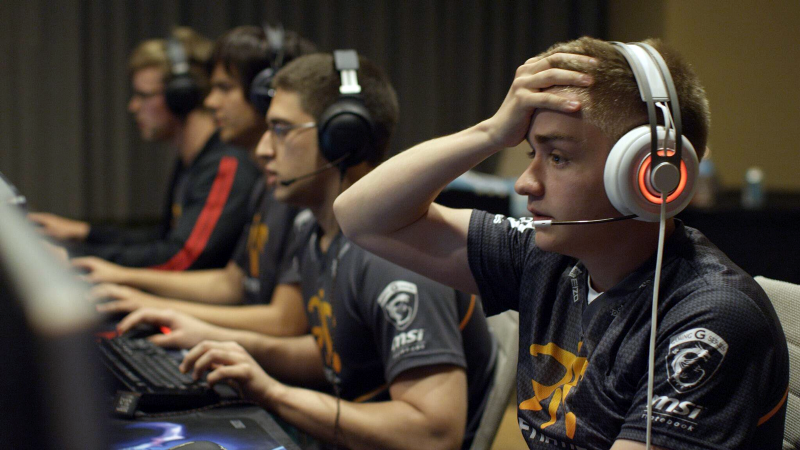
What I’m getting at is that Dota is a high pressure game with high pressure people, and if you can’t keep your cool under the pressure your mistake turns into more and that turns into a loss. This is the cyclic phenomenon that, in gaming, is known as tilt, a term gamers coined to capture the imbalance and slow deterioration of one’s composure during a game as pressure builds. It happens in lots of areas of life, but in Dota it usually looks like:
- You make a mistake .
- Your team is put at a disadvantage because of that mistake. This leads to them criticizing your mistake.
- Now you’re thinking about your mistake and their criticism, potentially arguing over whether or not it was even a mistake in the first place. This leads to you or your team making more mistakes. Congratulations, you’re tilted.
I can’t tell you how many games I’ve played where this cycle continues until people are at each other’s throats. The game devolves into a babysitting simulator, where you’re forced to try and keep your cool and remind your team to keep their cool. Most of the time, it ends in a loss.
The silver lining is that the enemy team can also tilt. The best teams make use of this pressure and try to compound on it. If I notice an enemy getting frustrated and making mistake after mistake, I will try to make that player have a worse game. That, in turn, makes the rest of their team play worse. Competent enemies will do this to you as well. Learning how to combat it is one of the most difficult parts of Dota.
Which brings me back to my original point: Dota is the ultimate carrot on a stick. No matter how good you get at the game, you are always playing with and against people. People are fallible. They will make mistakes. They will get angry. And you will have to deal with it. You can always get better at Dota, but getting better at people takes a lifetime.
Yet, all of this is what compels me to play. After countless frustrating games, some of which have even been with my own friends who I’ve gotten mad at or vice versa, I can say without a doubt that there’s a tranquility in this mental tug of war.
I’ve played games where my team has been on the verge of throwing their computers out the window, and we came back from near defeat, not because we’re good at the game, but because we got over our problems together. I’m sure that Dota is not alone in this aspect, as there are other team games that must have similar outcomes. But for me Dota is a place where I can find that tranquility and learn from it.
Which brings me to…
Lessons from 6000 Hours of Dota
Some people are toxic, and there’s nothing you can do about it.
There are games like I mentioned above where my team rallies against all odds and we come out drinking margaritas and sending friend requests.
And then there are games that are so hopeless that I uninstall the game afterward. Games where someone gets so tilted that no matter what, they are going to see everything as negative. Even when the game is clearly over, they cannot let go of it. I’ve had people friend request me on Steam just to argue with or even threaten me after these games.
What I’ve learned is that with these people, you have to understand that they aren’t worth your time. You can’t help everyone, and you can’t mesh with every team. In Dota there’s an option to mute players, be it enemy or ally. What I’ve started doing is if an ally says anything to me that indicates that they’re going to be rude the entire game, I mute them immediately. It’s not worth the emotional expenditure to manage someone else’s tantrum when you’re trying to focus on doing your best.
Some people are bad, and there’s nothing you can do about it.
I think this is far more difficult to internalize than it seems, especially among gamers, particularly Dota players.
Whether it’s because they’re having a bad day or aren’t doing things right, sometimes you’re matched with people who just don’t play well. In Dota, we poetically label them as bad. As I’ve said before, people not playing well tends to tilt players.
It might sound trivial, but you can’t do anything about these people. Accept that they’re bad and move on. There’s nothing wrong with playing poorly. It happens. Too many people fall into the trap of trying to psychoanalyze what’s going on when someone makes a mistake. Some criticism is healthy, but incessant criticism doesn’t do you or the bad player any favors.
There’s nothing inherently wrong with someone else playing bad, so don’t let it make you play bad.
Losing a close game is better than stomping an easy one.
Earlier I mentioned smurfs, players of a high skill who play in lower skill brackets to feel good about themselves. These games usually end in a stomp, meaning a game where one side wins so convincingly that the game feels unfair.
I’ve played my fair share of stomps on both the winning side and the losing side. While you might get that dopamine rush from winning the first few times, it gets old fast. In a game where you play hundreds, if not thousands, of similar, competitive games, why would you want to play one where there’s no challenge? For me, the stomps were never opportunities to learn. I gained nothing from them, except maybe some catharsis from outplaying opponents who never had a chance. They’re unmemorable at best.
On the other hand, the games where me and my team tried our hardest to the very last minute and still lost are the games that stand out. They’re also usually the ones where both teams end up acknowledging and respecting the other players. I yearn for these games, as they teach me the most, and are fun to play.
I’d wager the same goes for life. I’d much rather take an L on something that was important to me, that taught me something up until the bitter end, than slide through an easy W and come out feeling mediocre.
Mindless repetition heals the soul.
Like most people my age, I work. Even before I worked a full-time job, I was always working at school or a part-time job. Outside of the actual work, there’s life, and life can hit hard. I spend most of my time thinking critically for work with my brain, and another significant portion thinking critically for life with my heart. Between keeping track of family, friends, politics, and everything else that goes on in the world, sometimes I just need a break.
A break where I’m not thinking about the rest of the world at all.
In positive psychology, there’s a phenomenon known as flow, AKA the zone. Coined by Mihaly Csikszentmihalyi in his work on “optimal experience”, flow describes the state where one is completely, effortlessly absorbed in what they’re doing in a positive, hyper-focused manner. You’ve probably felt flow at one time or another in your life, maybe at work or doing something you love. When you get into the zone, you’re doing without thinking, and enjoying every moment.
Dota scratches this itch for me. It can be mindless and repetitive, but playing Dota puts me in the zone. My body knows how to go through all of the actions with minimal effort. It takes me away from whatever is going on in life, and lets my mind ease up. The ironic part of this is that sometimes games of Dota are so frustrating. Yet, the experience remains meditative. Better yet is when I get to play with friends, because then I get both meditative and social benefits.
I will say it hasn’t always been like this for me. It’s taken me years of conditioning my mental state to resist tilting, but now I can almost always hop into a game of Dota and come out feeling refreshed.
Even though I don’t always turn to Dota these days to escape, I’ve learned to carry this mindless catharsis into other activities. I consider it to be the most important thing Dota has taught me.
Time is precious and you’re going to regret how you spent yours.
This final point hurts the most. Looking back, even though Dota has given me so much, and I’ve mostly enjoyed it, it’s hard to see those 6000 hours and not wonder what I could have done with that time.
They say that it takes 10,000 hours to become a master at anything. That means I’m over halfway to becoming a master at Dota, at something that will never go anywhere. I could sit here and tell myself that maybe some day I could go pro, make money on Dota. Lots of others have followed that path, many who are my age live it happily.
Dota is a great game to go pro in from a career perspective, granting that eSports is still a volatile career move. Valve’s biggest tournament, The International, which annually hosts 16 of the best Dota pro teams from around the world, has one of the largest prize pool of any eSports tournament in the world. Every year that community-funded prize pool has gotten bigger, with last year’s exceeding $34m dollars. In 2019, Dota ranked 2nd on the top 10 list for eSports prize pools.
But I don’t want to be a Dota pro. I’ve chosen my career and love it, and I don’t want to imagine how playing (or casting) Dota might feel different if it was putting bread on the table. Plus pros practice all day, every day. Their life is the game, and that’s not what I want.
So then there’s really no endgame for the hours I’ve put in. It’s a hobby and nothing more. In the past, when I’ve quit Dota it’s been because I felt like I was wasting my time. The hours I was putting in didn’t feel worth what I was getting out.
Nowadays, I feel differently. I have expectations for my life that I balance with my hobbies. I know exactly what I’m looking for when I sit down to play Dota, or any game for that matter. People will still see that I’ve put 6000 hours into this game and wonder why, but I no longer feel like I have anything I need to explain. It was just fun.
There will always be time to think that I could have done something else, but I try to focus on the memories I’ve had in my 6000 hours. I think about all of the friends I’ve played with, and the laughs I’ve had. I focus on the positive flow and meditative aspects, and use the macro experience to give me perspective on what I want in my future.
Simply, I wouldn’t be the person I am if I hadn’t wasted those 6000 hours. Good or bad, I’m here now and happy.
Sometimes you have to stop playing games.
I don’t want to make it sound like my entire 6000 hours has led only to sunshine and rainbows. Unfortunately, too many times in the past I’ve let this game turn me into someone I couldn’t recognize.
It starts the same. A quick game turns into an all-day affair. Before I know it, it’s 4am and my eyes are begging me to tear away from the screen. I’m livid from losing game after game, but determined to go out on a win, just like a gambler.
As I get more and more tilted, I say things to the strangers on my team that I would never say in real life. Dota is a toxic environment, like many online games. It’s common for people to trash talk each other to no end. While I rarely trash talk people, when I do I never go for the norm of people calling each other racial slurs or insulting their intelligence. But still, I don’t like the things that I have said, the arguments I’ve gotten into over meaningless stats and meta-discussions.
I hate being in that space, and I do everything I can to stay far from it these days. The reality is that Dota does feel like something you can always come back to, and that makes it easy to play and play and play some more.
Ironically, I’m sure most of the worst games of Dota I’ve played have been when I’ve been too tired to play properly. I’ll go into games knowing that I’m going to play sub-optimally. It’s a common weakness among Dota players (re: tilt).
Sometimes the hardest part of playing this game is knowing when to stop. It’s also often the best thing you can do to improve.
I know that on more than one occasion it’s improved my life to take a step back and remember that the person getting into angry discussions over niche strategies in Dota is not who I am nor want to be.
On Addiction
I still play Dota today, though not as often nor with the same vigor that I use to. As I look forward to what my future holds, I’m excited to think about how I will take the lessons from all of the years I’ve spent playing games and use them to shape my life. I’ve spoken about how Dota and games have influenced my life in other articles, for better or worse.
That said, video game addiction is serious, despite overarching attempts to downplay it when compared to drug or alcohol addiction. In 2018, the World Health Organization even added “gaming disorder” to its medical reference book.
I consider myself lucky to have had such a positive and fortunate experience with how much time I’ve spent in games, and to know what to look for in myself when games are affecting me negatively.
There are people who are less fortunate than me though, and I encourage more people to talk about their experience dropping thousands of hours in games.
I write all this in hopes that we keep our minds open about the role games play in our lives, and focus on harnessing the positive parts of gaming and the gaming community, while being careful not to shame or neglect the growing population that uses them as an escape.
Appendix
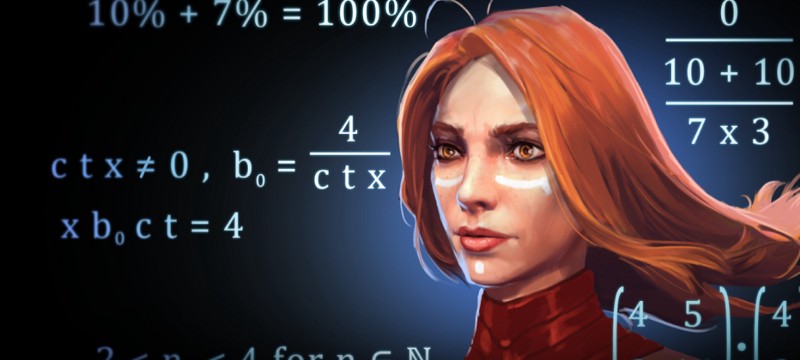
1 Dota matches vary in length according to a number of factors, such as game variant, skill level, and the current meta. If you’re unfamiliar with meta in the context of games, it’s a term to capture playing patterns about a game, usually over a particular time-frame. In Dota these time-frames are by patch, meaning an update to the game that affects gameplay. If the meta encourages players to play fast-paced and end the game quickly, then the average match time will be lower.
Historically, the most-played Dota game variants are All-Pick and Ranked All-Pick, the difference being that the Ranked version pits players against other players of similar skill level. All-Pick is a variant where every Dota hero is available, both players have opportunities to pick and ban from that entire hero pool, and the game plays normally (no special modifiers such as increased experience, gold, special events).
Taking all this in to account we find the average match duration hovers around 40 minutes. Players tend to play more seriously in ranked games, which may explain why there’s such a disparity between ranked and unranked All-Pick.
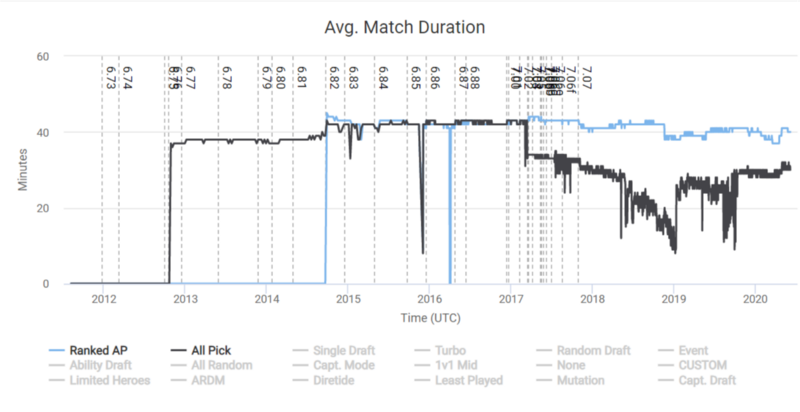
2The average pro player is a pro for more than just ranking on the leaderboard, AKA their MMR (Matchmaking Rating). However, MMR gives us a fairly accurate qualifier for skill level.
Dota is further broken down into skill brackets with each bracket covering a range of MMR. They range from Herald (0 to ~700 MMR) all the way to Divine (~4600 to ~5500 MMR). There is a bracket above Divine, which is called Immortal. Immortal players are in a separate division and get a place on the leaderboard for the region they play in.
Here is a visual based on the current (4th) matchmaking season that shows the distribution of players by MMR.
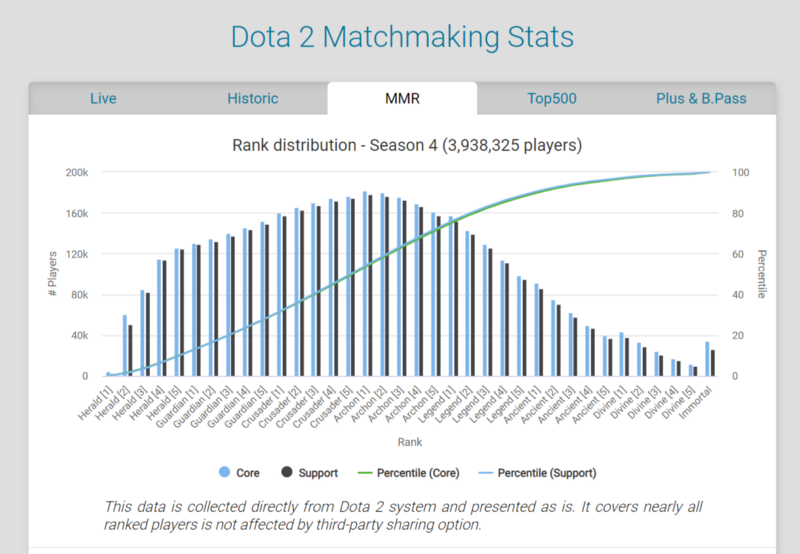
Note that Immortal players are in the 99th percentile of all players.
It’s important to note that not all players choose to report their profile to stat websites like this. Some profiles are private, but most active players have a public profile. Hence, while this is an accurate representation, it is not exact. Only Valve has the true exact numbers, and the only record I could find of them commenting on the exact distribution is in a blog post from 2013, where they remark that the average player is 2,250 MMR. It’s been 6 years since that post, but it’s safe to assume that it’s still close to that average given the data we see above.
At my peak, I hit 5800 MMR, which put me in the Immortal division and landed me roughly the 3,300th spot on the leaderboard for the North America region. I’m no longer rank 3,300, but here you can find the current leaderboard.
While there have been pros placed in the 6000 MMR range, most of them are significantly higher than that. At the tip top of the leaderboard, players like Arteezy have reached 10,000 MMR. It’s no understatement to say Arteezy plays with the best of the best. The average player MMR that Arteezy plays with appears to be around 8000 MMR, based on the last 8 days of his matches verified by Dota2ProTracker.
Colloquially, 8000 MMR is also generally what people agree is pro leagues.
So, from a pure math perspective how long would it take me to reach 8000 MMR and be considered for a pro team?
Typically, a win in Dota grants +30 MMR, while a loss is -30 MMR. These numbers fluctuate with the disparity between your team’s average MMR and the enemy team’s average MMR. While normally you would not always get +30 MMR for a win, let’s assume the best case scenario.
So at +30 MMR each win, if I had a 100% winrate, how many wins would it take me to hit 8,000 MMR from my peak MMR?
8,000-5,800 = 2,200 = x * 30
2,200/30 = x = 73.3
74 wins in a row. Doesn’t sound impossible until you factor in my win rate, i.e. the probability that I win a match. I have a pretty good win rate as far as Dota players go, sitting currently at 53.58%.
If we assume, and it’s a big assumption, that I can hold onto that win rate as I continue to climb, how many games would it take, assuming all wins and losses are +/- 30 MMR?
In 1,000 games, I would expect to win 536 of them, and lose 464 of them. That means I’d have +72 wins.
536–464 = 72
72 * 30 = 2,160
That’d put me at 7,960 MMR. Almost there!
But that’s a whole 1,000 games playing at the caliber I’m already playing at and higher. 1,000 games is 20% of my total played. That’s a big ask. Even if I did all of that, I still wouldn’t be guaranteed to become a pro player, as I said above it takes more.
In conclusion, even though I’m in the 99th percentile of players, I’m still a whole league away from pros.
2020-06-12T19:27:26.949Z